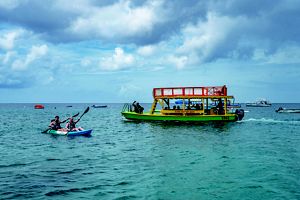Is this beach worth the drive? Is this fishing excursion appropriate for my group? Today, it’s hard to imagine planning a trip without checking tourism review websites.
When Mark Spalding, a senior marine scientist with The Nature Conservancy’s Global Protect Oceans, Lands and Waters team, looks at those same websites, he sees more than vacation advice. “They are free, ever-expanding sources of data,” he says.
Mark and a team of scientists used massive amounts of data from public, user-generated internet sites to aggregate and analyze hundreds of thousands of records of travel to destinations with coral reefs, such as tourists’ underwater photos. The results, published in 2017, include the staggering finding that globally, coral reefs generate $36 billion in tourism revenue each year.
According to Mark, that research inspired TNC and a diverse group of partners to put big data to work on a more granular scale to help develop actionable solutions to protect coral reefs. “We focused on the Eastern Caribbean, where small island nations control expansive marine areas with globally significant reefs—and snorkeling, paddle boarding, bird-watching, dining out and other tourism-related activities power the economy.”

Coral Reefs
More than a quarter of all marine species spend at least some part of their life cycle in coral reefs.

The Carribean
The Caribbean is more dependent on tourism than any other region in the world.
Partners worked with the online travel platform Tripadvisor and collaborated with local people. They also utilized artificial intelligence, in collaboration with Microsoft’s AI for Earth team, to read travel reviews and novel sources such as eBird, a Cornell Lab of Ornithology project that catalogs crowdsourced bird sightings. The information is being used to support several innovative local conservation strategies.
The same approaches are now being applied to increasing the understanding of recreational fishing. “This use of technology is building knowledge of the location of natural and economic dependencies,” says Mark. “That means decisions around policies and practices affecting recreational and commercial fishing can be made in context. The information can also be applied to issues such as managing shipping routes and the planning of offshore energy development and mining, ensuring that the human benefit of experiencing the diversity and majesty of nature is not voiceless against commercial enterprise.”



